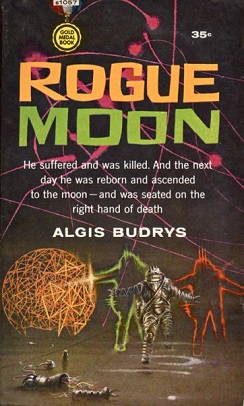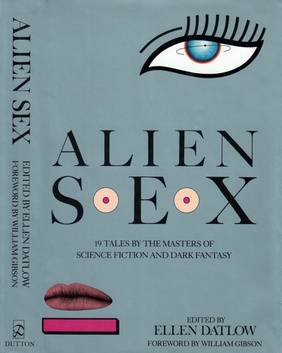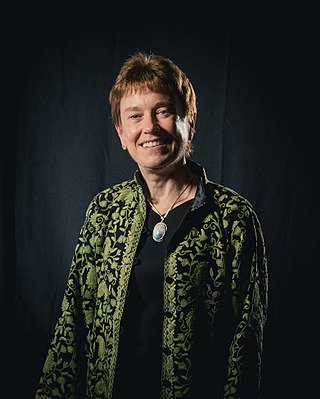
Theodore Sturgeon was an American fiction author of primarily fantasy, science fiction, and horror, as well as a critic. He wrote approximately 400 reviews and more than 120 short stories, 11 novels, and several scripts for Star Trek: The Original Series.

Philip José Farmer was an American author known for his science fiction and fantasy novels and short stories.

Geoffrey Alan Landis is an American aerospace engineer and author, working for the National Aeronautics and Space Administration (NASA) on planetary exploration, interstellar propulsion, solar power and photovoltaics. He holds nine patents, primarily in the field of improvements to solar cells and photovoltaic devices and has given presentations and commentary on the possibilities for interstellar travel and construction of bases on the Moon, Mars, and Venus.
The Heechee Saga, also known as the Gateway series, is a series of science fiction novels and short stories by Frederik Pohl. The Heechee are an advanced alien race that visited the Solar System hundreds of millennia ago and then mysteriously disappeared. They left behind bases containing artifacts, including working starships, which are discovered and exploited by humanity.

Charles David George "Charlie" Stross is a British writer of science fiction and fantasy. Stross specialises in hard science fiction and space opera. Between 1994 and 2004, he was also an active writer for the magazine Computer Shopper and was responsible for its monthly Linux column. He stopped writing for the magazine to devote more time to novels. However, he continues to publish freelance articles on the Internet.

Robert David Reed is a Hugo Award-winning American science fiction author. He has a Bachelor of Science in Biology from the Nebraska Wesleyan University. Reed is an "extraordinarily prolific" genre short-fiction writer with "Alone" being his 200th professional sale. His work regularly appears in Asimov's, Fantasy & Science Fiction, and Sci Fiction. He has also published eleven novels. As of 2010, Reed lived in Lincoln, Nebraska with his wife and daughter.

"The World Well Lost" is a science fiction short story by American writer Theodore Sturgeon, first published in the June 1953 issue of Universe. It has been reprinted several times, for instance in Sturgeon's collections E Pluribus Unicorn, Starshine, and A Saucer of Loneliness. The story takes its title from the subtitle of John Dryden's verse drama All for Love.

Saturn has made appearances in fiction since the 1752 novel Micromégas by Voltaire. In the earliest depictions, it was portrayed as having a solid surface rather than its actual gaseous composition. In many of these works, the planet is inhabited by aliens that are usually portrayed as being more advanced than humans. In modern science fiction, the Saturnian atmosphere sometimes hosts floating settlements. The planet is occasionally visited by humans and its rings are sometimes mined for resources.

Rogue Moon is a short science fiction novel by American writer Algis Budrys, published in 1960. It was a 1961 Hugo Award nominee. A substantially cut version of the novel was originally published in F&SF; this novella-length story was included in The Science Fiction Hall of Fame, Volume Two, edited by Ben Bova. It was adapted into a radio drama by Yuri Rasovsky in 1979.

Charlie Jane Anders is an American writer and commentator. She has written several novels as well as shorter fiction, published magazines and websites, and hosted podcasts. In 2005, she received the Lambda Literary Award for work in the transgender category, and in 2009, the Emperor Norton Award. Her 2011 novelette Six Months, Three Days won the 2012 Hugo and was a finalist for the Nebula and Theodore Sturgeon Awards. Her 2016 novel All the Birds in the Sky was listed No. 5 on Time magazine's "Top 10 Novels" of 2016, won the 2017 Nebula Award for Best Novel, the 2017 Crawford Award, and the 2017 Locus Award for Best Fantasy Novel; it was also a finalist for the 2017 Hugo Award for Best Novel.

The Dreaming Jewels, also known as The Synthetic Man, is a science fiction novel by American writer Theodore Sturgeon. It was his first published novel.

Flowers for Algernon is a short story by American author Daniel Keyes, later expanded by him into a novel and subsequently adapted for film and other media. The short story, written in 1958 and first published in the April 1959 issue of The Magazine of Fantasy & Science Fiction, won the Hugo Award for Best Short Story in 1960. The novel was published in 1966 and was joint winner of that year's Nebula Award for Best Novel.

Saturn's Children is a 2008 science fiction novel by British author Charles Stross. Stross called it "a space opera and late-period [Robert A.] Heinlein tribute", specifically to Heinlein's 1982 novel Friday.
Graham Sleight is a British writer, editor and critic, specialising in healthcare and science fiction. He is Head of Governance and Contracts at the Royal College of Paediatrics and Child Health, and editor of the science fiction peer-reviewed literary magazine, Foundation. His criticism has appeared in Strange Horizons, The New York Review Of Science Fiction, and Vector. He also writes a column for Locus. Several volumes in the Gollancz SF Masterworks series contain introductions written by Sleight. In 2005 and 2006 he was a judge of the Arthur C. Clarke Award. He is Managing Editor of the third edition of The Encyclopedia of Science Fiction (SFE3).
"Slow Sculpture" is a science fiction short story by American writer Theodore Sturgeon. First published in the Galaxy Science Fiction issue of February 1970, it won the 1970 Nebula Award for Best Novelette and the 1971 Hugo Award for Best Short Story.

"And I Awoke and Found Me Here on the Cold Hill's Side" is a science fiction short story by American author James Tiptree, Jr. Originally published in The Magazine of Fantasy & Science Fiction, the short story has been republished in several anthologies.

Carolyn Ives Gilman is an American historian and author of science fiction and fantasy. She has been nominated for the Nebula Award three times, and the Hugo Award twice. Her short fiction has been published in a number of magazines and publications, including Fantasy and Science Fiction, Interzone, Realms of Fantasy and Full Spectrum, along with a number of "year's best" anthologies. She is also the author of science fiction novels such as Halfway Human, which is noted for its "groundbreaking" exploration of gender.

All the Birds in the Sky is a 2016 science fantasy novel by American writer and editor Charlie Jane Anders. It is her debut speculative fiction novel and was first published in January 2016 in the United States by Tor Books. The book is about a witch and a techno-geek, their troubled relationship, and their attempts to save the world from disaster. The publisher described the work as "blending literary fantasy and science fiction".
The Science Fiction Awards Database (SFADB) is an index of science fiction, fantasy, and horror awards compiled by Mark R. Kelly and published by the Locus Science Fiction Foundation. Known formerly as the Locus Index to SF Awards, it has been cited as an invaluable science fiction resource, and is often more up-to-date than the awards' own websites.

An Informal History of the Hugos is a 2018 reference work on science fiction and fantasy written by Jo Walton. In it, she asks if the nominees for the Hugo Award for Best Novel were indeed the best five books of the year, using as reference shortlists from other awards in the genre. After looking at the first 48 years of the award and presenting essays on select nominees, Walton concludes that the Hugo has a 69% success rate. The book was well-received and was itself nominated for a Hugo Award in 2019.
















